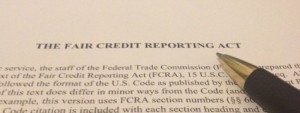 The Fair Credit Reporting Act (also known as FCRA) was enacted in 1970, it restricts who can access a person’s credit information and how they can use this information. Major revisions were made to the act in the late 1990’s and in 2003 the FACTA amendment was added. This amendment gave consumers greater access to their credit information (such as free access to their credit reports once annually) and put in place more safeguards for credit information (such as truncation of credit and debit card numbers and ability to add identity theft/fraud warnings to their credit files).
The Fair Credit Reporting Act (also known as FCRA) was enacted in 1970, it restricts who can access a person’s credit information and how they can use this information. Major revisions were made to the act in the late 1990’s and in 2003 the FACTA amendment was added. This amendment gave consumers greater access to their credit information (such as free access to their credit reports once annually) and put in place more safeguards for credit information (such as truncation of credit and debit card numbers and ability to add identity theft/fraud warnings to their credit files).
Contents
The FCRA, along with the amendment FACTA offer individuals the following rights:
1. Individuals have the right to know what’s in their credit reports.
1.1 Individuals have the right to access their report for free once every twelve months from each of the three bureaus (TransUnion, Equifax & Experian).
Find out how to access your credit report for free with our how to guide
1.2 Individuals also have the right to access their reports for free from any of the “nationwide specialty consumer reporting agencies”.
Find out more about these agencies and how to access your reports
2. Individuals have the right to access their credit score. Unlike credit reports these don’t need to be provided for free, but must be provided “…at a reasonable price”. Most credit bureaus sell access to these credit scores for anywhere from $7.95 to $19.95.
Find out how to get your FICO score (the score lenders ACTUALLY look at) for free
2.1 In the event that adverse action is taken (e.g an applicant is denied for a loan) the creditor must supply the applicant with any credit scores used, along with the score range of that credit score and the name of the credit bureau that supplied the credit report which was used to calculate the score. They must also provide a free copy of this credit report.
2.1.1 When applying for a mortgage the creditor must provide the applicant with all of the reports and scores (including the score range and name of bureau) used regardless of whether adverse action is taken.
3. Individual’s credit reports have strict requirements on who can view them. Under FCRA people need a permissible purpose to view an individuals credit report. A person or company will usually only have a permissible purpose if an individual applies for a loan, credit, service or employment.
Full list of reasons as to why a person is legally allowed to view your credit report
3.1 Consumer reporting agencies must get an individuals consent before supplying an employer or potential employer with their credit report.
4. Consumer reporting agencies must delete outdated information. After a period of seven years negative items must be removed from an individuals credit report. The exceptions are bankruptcies (must be removed after a period of ten years) and tax liens (must be removed seven years after they’ve been paid).
5. Individuals have the right to dispute incorrect, incomplete or unverifiable information. Creditors and consumer reporting agencies must investigate and correct this information within 30 days of receiving the dispute. 45 days if the dispute is based upon information found in a credit report that was given for free under FCRA.
Learn how to remove negative items from your credit report
5.1 Negative items that are removed must not be readded without notifying the consumer in writing within five days.
6. Individuals have the right to opt-out of the nationwide credit bureaus marketing lists. Individuals can do so by calling 188-567-8688 (188-5OPT-OUT) this will stop creditors from sending prescreened offers for credit and insurance products.
7. Individuals have the right to place red flags on their credit reports. If an individual thinks they are at risk of fraud or identity theft they can place an alert on their report for 90 days for free. This lets creditors know they need to double check an individuals identity before approving them.
7.1 If individuals want to make their report inaccessible, then they need to place a credit freeze on their account.
How to place a credit freeze on your account
Under FCRA & The FACTA Amendment Creditors Are Required To:
1. Provide up to date, complete and accurate information to the consumer reporting agencies (also known as credit bureaus).
2. Are responsible for investigating consumer disputes. They also must correct errors or provide proof as to why the information reported is correct within 30 days of receiving the dispute.
3. Must notify individuals that negative information will be placed on a consumers credit report within 30 days.
For example, if you pay your credit card bill late most credit card issuers will notify you that they are placing negative information on your next statement. View a sample of a notice of negative information here.
Reporting Violators Of FCRA
If a consumer believes a person or company is violating the laws set out under FCRA they should:
- Report the violation to the FTC (877) FTC-HELP
- Report the violation to the State Attorney General’s Office
- They can obtain an attorney and sue for damages in court
If they sue in court the minimum amount awarded is $100 and the maximum $1,000, they can also recovery reasonable court costs and attorney fees.

There’s certainly a lot to know about his issue. I love all of the points you made.